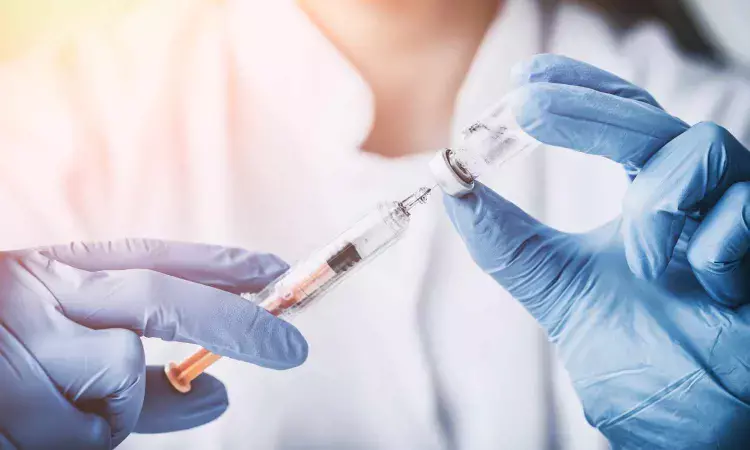- Home
- Medical news & Guidelines
- Anesthesiology
- Cardiology and CTVS
- Critical Care
- Dentistry
- Dermatology
- Diabetes and Endocrinology
- ENT
- Gastroenterology
- Medicine
- Nephrology
- Neurology
- Obstretics-Gynaecology
- Oncology
- Ophthalmology
- Orthopaedics
- Pediatrics-Neonatology
- Psychiatry
- Pulmonology
- Radiology
- Surgery
- Urology
- Laboratory Medicine
- Diet
- Nursing
- Paramedical
- Physiotherapy
- Health news
- Fact Check
- Bone Health Fact Check
- Brain Health Fact Check
- Cancer Related Fact Check
- Child Care Fact Check
- Dental and oral health fact check
- Diabetes and metabolic health fact check
- Diet and Nutrition Fact Check
- Eye and ENT Care Fact Check
- Fitness fact check
- Gut health fact check
- Heart health fact check
- Kidney health fact check
- Medical education fact check
- Men's health fact check
- Respiratory fact check
- Skin and hair care fact check
- Vaccine and Immunization fact check
- Women's health fact check
- AYUSH
- State News
- Andaman and Nicobar Islands
- Andhra Pradesh
- Arunachal Pradesh
- Assam
- Bihar
- Chandigarh
- Chattisgarh
- Dadra and Nagar Haveli
- Daman and Diu
- Delhi
- Goa
- Gujarat
- Haryana
- Himachal Pradesh
- Jammu & Kashmir
- Jharkhand
- Karnataka
- Kerala
- Ladakh
- Lakshadweep
- Madhya Pradesh
- Maharashtra
- Manipur
- Meghalaya
- Mizoram
- Nagaland
- Odisha
- Puducherry
- Punjab
- Rajasthan
- Sikkim
- Tamil Nadu
- Telangana
- Tripura
- Uttar Pradesh
- Uttrakhand
- West Bengal
- Medical Education
- Industry
New Malaria Vaccine Candidate Blocks Parasite Transmission, Study Shows

USA: A vaccine aimed at halting the spread of Plasmodium falciparum-the parasite responsible for the deadliest form of malaria-has demonstrated encouraging early results, a phase 1 clinical study published in NEJM Evidence has revealed.
While the initial primary endpoint did not show a significant reduction in transmission shortly after vaccination, participants who received the full dosing regimen achieved marked declines in mosquito infection rates over two years, highlighting the potential of transmission-blocking vaccines as a complement to existing malaria-control measures.
The study was led by Dr. Sara A. Healy, consulting clinical investigator at the Laboratory of Malaria Immunology and Vaccinology, National Institute of Allergy and Infectious Diseases, NIH, Bethesda, Maryland, in collaboration with colleagues in Mali. Conducted in three villages near Bamako, the trial assessed whether a protein-based vaccine, Pfs230D1–exoprotein A (EPA), formulated with the adjuvant AS01, could interrupt parasite transmission from humans to mosquitoes.
Researchers first carried out a comparator-controlled, dose-escalating safety study followed by a randomized, double-blind main trial involving more than 300 Malian adults. Participants received either a full-dose schedule of four injections (40 µg of Pfs230D1-EPA with AS01 at 0, 1, 4, and 16 months) or a fractional schedule with a reduced third dose.
Key Findings:
- The vaccine was well tolerated across both dosing groups, with no serious adverse events reported.
- The most common side effects were mild to moderate, including local pain, fever, and headache.
- Both dosing regimens triggered strong antibody responses, mainly IgG1, which lasted for about a year after the third dose.
- Laboratory mosquito feeding assays showed that serum from vaccinated participants reduced parasite development in mosquitoes, with activity closely linked to antibody levels.
- In field testing, no significant reduction in transmission was observed six weeks after the third dose during direct skin-feeding experiments.
- The fourth dose proved critical, as the full regimen led to over a 70% reduction in the proportion of infected mosquitoes and up to a 90% decline in parasite transmission events during the second year of follow-up.
Unlike the currently available vaccines RTS and R21, which target the parasite’s early liver stage and are primarily used in children, the Pfs230D1 candidate is designed to block transmission, providing a different mechanism of protection that could strengthen community-level defenses. The researchers noted that mathematical models suggest combining liver-stage vaccines with transmission-blocking vaccines could amplify herd immunity, reducing disease burden in high-transmission settings and aiding elimination efforts in lower-burden regions.
"At a time when malaria cases are once again rising due to drug and insecticide resistance, climate influences, and funding challenges, the findings point to the value of innovative approaches. Pairing transmission-blocking vaccines with established interventions such as mosquito control, insecticide-treated nets, and antimalarial therapies may represent a powerful strategy to curb the global burden of malaria and bring the goal of eradication closer to reality," the authors concluded.
Reference:
Healy SA, Sagara I, Assadou MH, Katile A, Kone M, Imeru A, Kwan JL, Swihart BJ, Fintzi J, Potter GE, Zeguimé A, Dolo A, Diarra B, Narum DL, Rausch KM, MacDonald NJ, Zhu D, Mohan R, Thera I, Morrison RD, Zaidi I, Doritchamou JYA, Sylla D, Hume JCC, Coulibaly MB, Morelle D, Lievens M, Doumbo OK, Duffy PE; Pfs230D1 Vaccine Team. A Vaccine to Block Plasmodium falciparum Transmission. NEJM Evid. 2025 Jul;4(7):EVIDoa2400188. doi: 10.1056/EVIDoa2400188. Epub 2025 Jun 24. PMID: 40552966.
Dr Kamal Kant Kohli-MBBS, DTCD- a chest specialist with more than 30 years of practice and a flair for writing clinical articles, Dr Kamal Kant Kohli joined Medical Dialogues as a Chief Editor of Medical News. Besides writing articles, as an editor, he proofreads and verifies all the medical content published on Medical Dialogues including those coming from journals, studies,medical conferences,guidelines etc. Email: drkohli@medicaldialogues.in. Contact no. 011-43720751
Next Story


